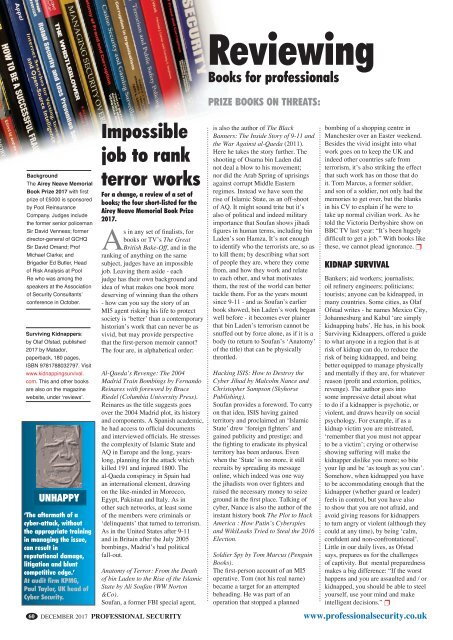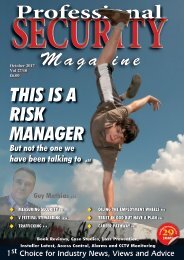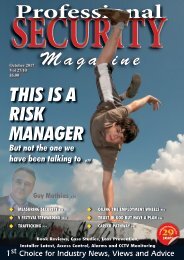Draft27-12
Create successful ePaper yourself
Turn your PDF publications into a flip-book with our unique Google optimized e-Paper software.
Reviewing<br />
Books for professionals<br />
prize books on threats:<br />
Background<br />
The Airey Neave Memorial<br />
Book Prize 2017 with first<br />
prize of £5000 is sponsored<br />
by Pool Reinsurance<br />
Company. Judges include<br />
the former senior policeman<br />
Sir David Venness; former<br />
director-general of GCHQ<br />
Sir David Omand; Prof<br />
Michael Clarke; and<br />
Brigadier Ed Butler, Head<br />
of Risk Analysis at Pool<br />
Re who was among the<br />
speakers at the Association<br />
of Security Consultants’<br />
conference in October.<br />
Surviving Kidnappers:<br />
by Olaf Ofstad, published<br />
2017 by Matador,<br />
paperback, 180 pages,<br />
ISBN 9781788032797. Visit<br />
www.kidnappingsurvival.<br />
com. This and other books<br />
are also on the magazine<br />
website, under ‘reviews’.<br />
60<br />
UNHAPPY<br />
‘The aftermath of a<br />
cyber-attack, without<br />
the appropriate training<br />
in managing the issue,<br />
can result in<br />
reputational damage,<br />
litigation and blunt<br />
competitive edge.’<br />
At audit firm KPMG,<br />
Paul Taylor, UK head of<br />
Cyber Security.<br />
Impossible<br />
job to rank<br />
terror works<br />
For a change, a review of a set of<br />
books; the four short-listed for the<br />
Airey Neave Memorial Book Prize<br />
2017.<br />
As in any set of finalists, for<br />
books or TV’s The Great<br />
British Bake-Off, and in the<br />
ranking of anything on the same<br />
subject, judges have an impossible<br />
job. Leaving them aside - each<br />
judge has their own background and<br />
idea of what makes one book more<br />
deserving of winning than the others<br />
- how can you say the story of an<br />
MI5 agent risking his life to protect<br />
society is ‘better’ than a contemporary<br />
historian’s work that can never be as<br />
vivid, but may provide perspective<br />
that the first-person memoir cannot?<br />
The four are, in alphabetical order:<br />
Al-Qaeda’s Revenge: The 2004<br />
Madrid Train Bombings by Fernando<br />
Reinares with foreword by Bruce<br />
Riedel (Columbia University Press).<br />
Reinares as the title suggests goes<br />
over the 2004 Madrid plot, its history<br />
and components. A Spanish academic,<br />
he had access to official documents<br />
and interviewed officials. He stresses<br />
the complexity of Islamic State and<br />
AQ in Europe and the long, yearslong,<br />
planning for the attack which<br />
killed 191 and injured 1800. The<br />
al-Qaeda conspiracy in Spain had<br />
an international element, drawing<br />
on the like-minded in Morocco,<br />
Egypt, Pakistan and Italy. As in<br />
other such networks, at least some<br />
of the members were criminals or<br />
‘delinquents’ that turned to terrorism.<br />
As in the United States after 9-11<br />
and in Britain after the July 2005<br />
bombings, Madrid’s had political<br />
fall-out.<br />
Anatomy of Terror: From the Death<br />
of bin Laden to the Rise of the Islamic<br />
State by Ali Soufan (WW Norton<br />
&Co).<br />
Soufan, a former FBI special agent,<br />
DECEMBER 2017 PROFESSIONAL SECURITY<br />
is also the author of The Black<br />
Banners: The Inside Story of 9-11 and<br />
the War Against al-Qaeda (2011).<br />
Here he takes the story further. The<br />
shooting of Osama bin Laden did<br />
not deal a blow to his movement;<br />
nor did the Arab Spring of uprisings<br />
against corrupt Middle Eastern<br />
regimes. Instead we have seen the<br />
rise of Islamic State, as an off-shoot<br />
of AQ. It might sound trite but it’s<br />
also of political and indeed military<br />
importance that Soufan shows jihadi<br />
figures in human terms, including bin<br />
Laden’s son Hamza. It’s not enough<br />
to identify who the terrorists are, so as<br />
to kill them; by describing what sort<br />
of people they are, where they come<br />
from, and how they work and relate<br />
to each other, and what motivates<br />
them, the rest of the world can better<br />
tackle them. For as the years mount<br />
since 9-11 - and as Soufan’s earlier<br />
book showed, bin Laden’s work began<br />
well before - it becomes ever plainer<br />
that bin Laden’s terrorism cannot be<br />
snuffed out by force alone, as if it is a<br />
body (to return to Soufan’s ‘Anatomy’<br />
of the title) that can be physically<br />
throttled.<br />
Hacking ISIS: How to Destroy the<br />
Cyber Jihad by Malcolm Nance and<br />
Christopher Sampson (Skyhorse<br />
Publishing).<br />
Soufan provides a foreword. To carry<br />
on that idea, ISIS having gained<br />
territory and proclaimed an ‘Islamic<br />
State’ drew ‘foreign fighters’ and<br />
gained publicity and prestige; and<br />
the fighting to eradicate its physical<br />
territory has been arduous. Even<br />
when the ‘State’ is no more, it still<br />
recruits by spreading its message<br />
online, which indeed was one way<br />
the jihadists won over fighters and<br />
raised the necessary money to seize<br />
ground in the first place. Talking of<br />
cyber, Nance is also the author of the<br />
instant history book The Plot to Hack<br />
America : How Putin’s Cyberspies<br />
and WikiLeaks Tried to Steal the 2016<br />
Election.<br />
Soldier Spy by Tom Marcus (Penguin<br />
Books).<br />
The first-person account of an MI5<br />
operative. Tom (not his real name)<br />
became a target for an attempted<br />
beheading. He was part of an<br />
operation that stopped a planned<br />
bombing of a shopping centre in<br />
Manchester over an Easter weekend.<br />
Besides the vivid insight into what<br />
work goes on to keep the UK and<br />
indeed other countries safe from<br />
terrorism, it’s also striking the effect<br />
that such work has on those that do<br />
it. Tom Marcus, a former soldier,<br />
and son of a soldier, not only had the<br />
memories to get over, but the blanks<br />
in his CV to explain if he were to<br />
take up normal civilian work. As he<br />
told the Victoria Derbyshire show on<br />
BBC TV last year: “It’s been hugely<br />
difficult to get a job.” With books like<br />
these, we cannot plead ignorance. p<br />
KIDNAP SURVIVAL<br />
Bankers; aid workers; journalists;<br />
oil refinery engineers; politicians;<br />
tourists; anyone can be kidnapped, in<br />
many countries. Some cities, as Olaf<br />
Ofstad writes - he names Mexico City,<br />
Johannesburg and Kabul ‘are simply<br />
kidnapping hubs’. He has, in his book<br />
Surviving Kidnappers, offered a guide<br />
to what anyone in a region that is at<br />
risk of kidnap can do, to reduce the<br />
risk of being kidnapped, and being<br />
better equipped to manage physically<br />
and mentally if they are, for whatever<br />
reason (profit and extortion, politics,<br />
revenge). The author goes into<br />
some impressive detail about what<br />
to do if a kidnapper is psychotic, or<br />
violent, and draws heavily on social<br />
psychology. For example, if as a<br />
kidnap victim you are mistreated,<br />
‘remember that you must not appear<br />
to be a victim’; crying or otherwise<br />
showing suffering will make the<br />
kidnapper dislike you more; so bite<br />
your lip and be ‘as tough as you can’.<br />
Somehow, when kidnapped you have<br />
to be accommodating enough that the<br />
kidnapper (whether guard or leader)<br />
feels in control, but you have also<br />
to show that you are not afraid, and<br />
avoid giving reasons for kidnappers<br />
to turn angry or violent (although they<br />
could at any time), by being ‘calm,<br />
confident and non-confrontational’.<br />
Little in our daily lives, as Ofstad<br />
says, prepares us for the challenges<br />
of captivity. But mental preparedness<br />
makes a big difference: “If the worst<br />
happens and you are assaulted and / or<br />
kidnapped, you should be able to steel<br />
yourself, use your mind and make<br />
intelligent decisions.” p<br />
www.professionalsecurity.co.uk<br />
p60 Books 27-<strong>12</strong>.indd 1 17/11/2017 10:52










